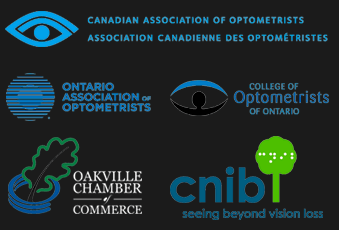All your eye health questions answered.
How Often Do I Need My Eyes Checked?
At Erin Mills Optometry your eye exam is highly dependant on your needs, your age, and your eye health and medical history. One of our optometrists will always advise you when your next eye exam should be.
The Canadian Association of Optometrists recommends the following as a guide:
- Preschool (2 to 5 years) – at age 3, and prior to entering elementary school (link to Kids eye exams page)
- School age (6 to 18 years) – annually
- Adult (19 to 64 years) – every one to two years
- Older adult (65 years and older) – annually
What Does 20/20 Vision Mean?
The sharpness of your vision is measured at a distance of 20 feet; so if you have 20/20 vision, it means you can clearly see what most individuals should be able to see at 20 feet. 20/20 vision doesn’t imply perfect vision as people with certain eye conditions, for example glaucoma, can have 20/20 vision and be considered legally blind due to their constricted field of view.
What Happens During an Eye Exam
Each eye exam is slightly different and is customized to our patient’s needs. Common elements of your examination will include:
- A thorough set of questions about your vision, general health, family history, visual demands due to your profession or hobbies as well as an assessment of your current medications.
- A comprehensive assessment of your visual acuity.
- Examination of your eyes from front to back using a variety of tools including microscopes, lights and magnifying glasses.
- Refractive and focusing testing.
- Testing your binocular vision – which tests the ability of your eyes to work together.
- Measurement of your eye pressure using a puff of air or a blue light.
Why Should I Get an Eye Exam?
Most people are not aware of the fact that their vision has changed and that they are no longer seeing 20/20 as most changes in vision occur slowly. Additionally, eye exams can help discover various eye diseases such as macular degeneration, and glaucoma. An eye exam with our Mississauga optometrists will ensure that your eyes are seeing as well as possible and help detect eye diseases in their early stages before any permanent vision loss has happened.
What Should I Bring to my Eye Exam?
If you wear contact lenses, bring your latest contact lens box. If you wear glasses, bring your most recent pair, even if you’re not currently wearing them. Additionally be ready to provide one of our doctors your previous eye and medical history as well as a list of medications that you are currently taking.
How Much Does an Eye Exam Cost?
OHIP covers the costs of eye exams in the following age categories:
- 0-19 years and younger -one full eye exam for vision and general eye health every 12 months, plus minor assessments.
- 20-64 years old – If you have a specific medical condition that affects your eyes or vision that requires regular monitoring, OHIP will cover a full eye exam every 12 months and any follow-up appointments related to the condition. Covered conditions include:
- Diabetes Mellitus
- Glaucoma
- Cataracts
- Retinal disease
- Visual field defects
- Corneal disease
- Recurrent Uveitis
- Optic Pathway disease
- 65 years and older -one full eye exam for vision and general eye health every 12 months, plus minor assessments.
What is the Difference Between an Optometrist, Ophthalmologist, and Optician?
An optometrist is a doctor of optometry that diagnoses, treats and manages disorders and diseases of the eye and vision system. An optometrist may prescribe drugs for the treatment of eye conditions, fit and adjust glasses, contact lenses or other vision devices.
An ophthalmologist is a physician who in addition to diagnosing and treating ocular disease by medical, or surgical means, may also offer visual assessments which includes prescriptions for corrective lenses.
An optician provides, fits and adjusts eyeglasses and contact lenses or other vision devices.
Why Does My Optometrist Use Eye Drops?
Some eye exams include the use of eye drops called mydriatics which are used to dilate the pupils to give your eye doctor a better view of the inside of your eye. The drops often leave your eyes slightly blurry and more sensitive to light. This is why you may not be able to drive immediately after this procedure. Depending on the patient, the effect of the drops wears off in 2-6 hours.
Other eye drops are sometimes used to relax the focus of the eyes in order to accurately measure the degree of far-sightedness of the eyes. These drops often have the same blurring and light sensitivity effects as those used to dilate pupils.
GET IN TOUCH
CONTACT
3115 Glen Erin Drive, Unit 4
Mississauga, ON, L5L 1J3
905-828-2383
info@erinmillsoptometry.com
Monday: 9:30AM – 7:30PM
Tuesday: 12:00PM – 7:30PM
Wednesday: 9:30AM – 6:00PM
Thursday: 9:00AM – 7:30PM
Friday: 9:30AM – 3:30PM

